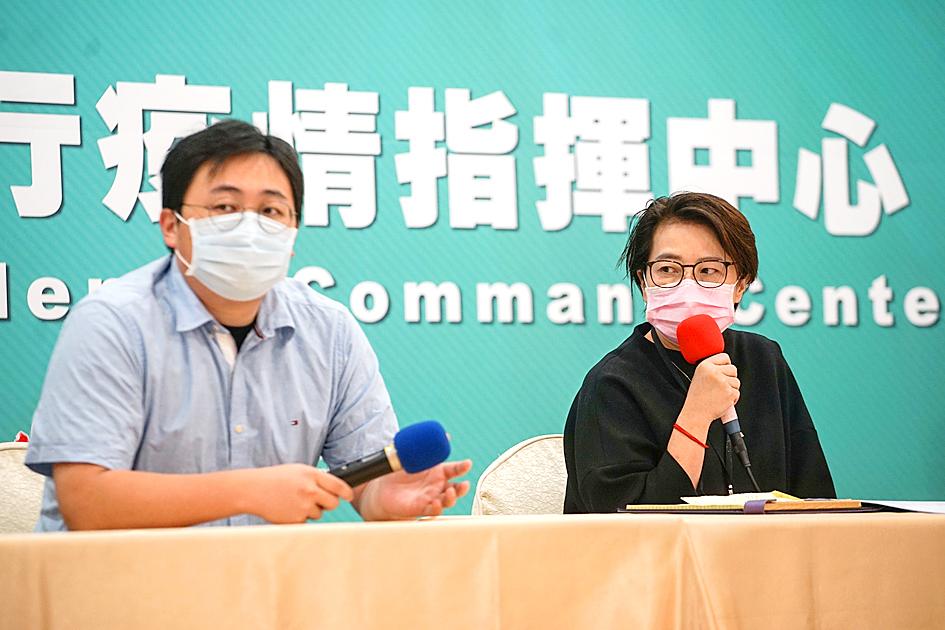The Taipei City Government is cracking down on owners of short-term rental units, including Airbnb listings, who have been offering their units for home quarantine or isolation stays, amid concern that such rentals could be a loophole in disease-prevention efforts.
As of Sept. 22, people under a home isolation or quarantine order can only stay at quarantine hotels, at home or at a place offered by another person free of charge, Taipei Deputy Mayor Vivian Huang (黃珊珊) told a news conference yesterday.
Owners of short-term rental units who rent to people under a home isolation or quarantine order would be fined between NT$3,000 and NT$15,000, and the owner’s name and the address of their accommodation would be made public, she said.

Photo: CNA
“People have to be responsible to whom they are offering their houses, so the fines would be aimed at the home owners,” she said.
While there might be cases of renters who are subleasing their units for short-term stays, it would be the owner of the unit whose name would be publicized if a reported breach is confirmed, she added.
After the Central Epidemic Command Center on Aug. 19 announced that people under quarantine can only stay at “quarantine hotels” certified by local governments, the Taipei City Government on Aug. 21 released a list of non-quarantine hotels in the city that had provided accommodation to people in quarantine.
As of Tuesday last week, the city had found 81 housing units that have accommodated people in quarantine more than five times, Huang said.
Some of the cases might involve company dormitories or people who have had several family members return from overseas, so the city would check the homes, but there have also been reports by borough wardens about a home that accommodated more than 10 people under quarantine, she said.
Short-term rental suites or non-quarantine hotels might not be able to perform the proper cleaning and disinfection required for quarantine facilities, in addition to bringing together a mix of residents and those under quarantine, which might increase the risk of cross infections, Huang said.

A magnitude 5.6 earthquake struck off the coast of Yilan County at 12:37pm today, with clear shaking felt across much of northern Taiwan. There were no immediate reports of damage. The epicenter of the quake was 16.9km east-southeast of Yilan County Hall offshore at a depth of 66.8km, Central Weather Administration (CWA) data showed. The maximum intensity registered at a 4 in Yilan County’s Nanao Township (南澳) on Taiwan’s seven-tier scale. Other parts of Yilan, as well as certain areas of Hualien County, Taipei, New Taipei City, Taoyuan, Hsinchu County, Taichung and Miaoli County, recorded intensities of 3. Residents of Yilan County and Taipei received

Taiwan has secured another breakthrough in fruit exports, with jujubes, dragon fruit and lychees approved for shipment to the EU, the Ministry of Agriculture said yesterday. The Animal and Plant Health Inspection Agency on Thursday received formal notification of the approval from the EU, the ministry said, adding that the decision was expected to expand Taiwanese fruit producers’ access to high-end European markets. Taiwan exported 126 tonnes of lychees last year, valued at US$1.48 million, with Japan accounting for 102 tonnes. Other export destinations included New Zealand, Hong Kong, the US and Australia, ministry data showed. Jujube exports totaled 103 tonnes, valued at

BIG SPENDERS: Foreign investors bought the most Taiwan equities since 2005, signaling confidence that an AI boom would continue to benefit chipmakers Taiwan Semiconductor Manufacturing Co’s (TSMC, 台積電) market capitalization swelled to US$2 trillion for the first time following a 4.25 percent rally in its American depositary receipts (ADR) overnight, putting the world’s biggest contract chipmaker sixth on the list of the world’s biggest companies by market capitalization, just behind Amazon.com Inc. The site CompaniesMarketcap.com ranked TSMC ahead of Saudi Aramco and Meta Platforms Inc. The Taiwanese company’s ADRs on Tuesday surged to US$385.75 on the New York Stock Exchange, as strong demand for artificial intelligence (AI) applications led to chip supply constraints and boost revenue growth to record-breaking levels. Each TSMC ADR represents

TRUST: The KMT said it respected the US’ timing and considerations, and hoped it would continue to honor its commitments to helping Taiwan bolster its defenses and deterrence US President Donald Trump is delaying a multibillion-dollar arms sale to Taiwan to ensure his visit to Beijing is successful, a New York Times report said. The weapons sales package has stalled in the US Department of State, the report said, citing US officials it did not identify. The White House has told agencies not to push forward ahead of Trump’s meeting with Chinese President Xi Jinping (習近平), it said. The two last month held a phone call to discuss trade and geopolitical flashpoints ahead of the summit. Xi raised the Taiwan issue and urged the US to handle arms sales to